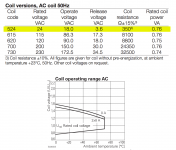I'm busy testing out this little circuit, a cheap & dirty delayed speaker-on:
ePanorama.net - Audio amplifier output relay delay
I have a 24VAC relay, with the attached specifications. It has an operating voltage of 18VAC.
Does this mean that the relay will therefore activate when, say, 22VAC is applied to it? Presumably "24V" is purely nominal then, and it has a range starting from 18V upwards?
ePanorama.net - Audio amplifier output relay delay
I have a 24VAC relay, with the attached specifications. It has an operating voltage of 18VAC.
Does this mean that the relay will therefore activate when, say, 22VAC is applied to it? Presumably "24V" is purely nominal then, and it has a range starting from 18V upwards?
Attachments
The circuit linked in post #1 (hosted on ePanorama) requires a relay with a 24 volt direct current coil. The incoming AC power supply is rectified and filtered into DC by the components marked in red. Then this DC voltage is applied to the coil of the relay after a suitable delay. Please notice the final item in the Parts List, marked in green. It's a DC relay.
_
_
Attachments
@Mark - Aaaaah, right - doh! Thanks for the heads-up.
Okay, given that I have a 22V secondary transformer, would this circuit work unmodified if I used a 24VDC relay with a 16VDC operating voltage?
Okay, given that I have a 22V secondary transformer, would this circuit work unmodified if I used a 24VDC relay with a 16VDC operating voltage?
... ....a 24VDC relay with a 16VDC operating voltage?
In experiment with a 12V relay, on a 9V battery, it worked with a fresh battery but quit after a few days because the battery sagged to 8V.
Get a relay and supply which nominally *match* (Volts and AC/DC). Don't push your luck with extreme limits or the thing will quit unpredictably.
Tricky-stuff "is" possible. I have a 110VAC relay which clacks OK with 68V of DC. For reliability I would hit it with more. But meanwhile I needed a solution "now" so went another way.
AC relays normally operate at a much lower voltage when used with DC, that's because of the coil inductance.
In fact, if you apply 24V DC to a 24V AC relay, there are good chances you fry it, because the current will be higher.
In general (there is no hard rule), the AC voltage is ~halved for DC.
You can infer this from the datasheet: 24V into 350Ω is more than the quoted 0.76VA.
You could send 0.76W (=16V) into the coil, but 16V is sufficient but not necessary: DC operation is much easier and requires less current anyway.
To summarize: you can use your relay on 18VDC, and you can probably add a series resistor to reduce the current consumption.
In fact, if you apply 24V DC to a 24V AC relay, there are good chances you fry it, because the current will be higher.
In general (there is no hard rule), the AC voltage is ~halved for DC.
You can infer this from the datasheet: 24V into 350Ω is more than the quoted 0.76VA.
You could send 0.76W (=16V) into the coil, but 16V is sufficient but not necessary: DC operation is much easier and requires less current anyway.
To summarize: you can use your relay on 18VDC, and you can probably add a series resistor to reduce the current consumption.
Last edited:
1) don´t mix AC and DC, label them properly.@Mark - Aaaaah, right - doh! Thanks for the heads-up.
Okay, given that I have a 22V **AC** secondary transformer, would this circuit work unmodified if I used a 24VDC relay with a 16VDC operating voltage?
2) the original schematic demands a 24V DC relay.
You say you will use a 24V DC relay.
So not sure about what the doubt is.
In case I am not clear: yes, of course, it will work, you will be using the component which is asked for.
As a side note, I am weary of using a small/weak "signal/preamp" transistor such as BC547 to drive a 24V DC, relatively high current inductive load such as a relay coil. No, the "protection diode" is there for a different purpose, killing reverse inductive peaks, but it won´t make the job easier for poor BC547.
I would use a higher rated transistor there, say a BC639, well more suited to the task.
Still TO92 and very inexpensive.
- Status
- Not open for further replies.
- Home
- Design & Build
- Parts
- Relay operating voltage - will my PSU work?

